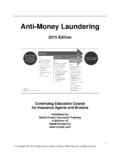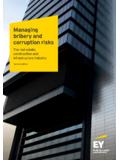Transcription of Young Professionals Programme 2017 …
1 Young Professionals Programme 2017 Assignments You will find details of the assignments in the descriptions below. They are grouped thematically to help you identify those which best match your profile and aspirations. You will be asked to indicate a maximum of three positions and to prioritise them according to your competencies and preferences. You will also be invited to respond to a series of questions whose relevance varies according to the assignment . Applications are open, apply here! Development Financing for development [DCD/CTP 1] Sustainable development in developing countries [DEV 2] Digitalisation Digitalisation [STI/GOV 3] Financial Action Anti-money laundering [DAF 4] Global Value Chains Global Value Chains [STD/DAF 5] Governance What Works: Putting evidence to work for better policies, programmes and practice [GOV/ELS 6] Urban policy [GOV 7] Green Growth Taxing energy use green growth [CTP/ENV 8] Climate change mitigation [ENV 9] Environmental Accounting and Green Growth Indicators [STD/ENV 10] Jobs strategy The Future of Work [ELS 11] Macro-modelling Project: Modelling structural economic policies [ECO 12] Project.
2 Modelling macro-economic structural adjustment and trade [ECO/TAD 13] 2 Skills strategy Skills and the digitalisation of economies and societies [EDU 14] National Skills Strategies [EDU/ELS 15] Strategic orientations Support for the delivery of the Secretary-General s Strategic Objectives [SGE 16] Strategy and co-ordination with non-members [GRS 17] Taxation Impact of the tax systems on innovation [CTP/STI 18] Trade Services Trade Restrictiveness Index [TAD 19] Well-being Well-being [STD 20] 3 Development Financing for development [DCD/CTP 1] Hosts: Development Finance Architecture Unit (DCD) Horizontal collaboration: Development Centre (DEV), Centre for Tax Policy and Administration (CTP) and Directorate for Financial and Enterprise Affairs (DAF) Other relevant background: , The Global Outlook on Financing for Development presents an overview of public and private, domestic and international financing for development.
3 The report will unpack how these financing pillars interlink from a policy perspective and what OECD members can do to maximise resource mobilisation. The report will position the OECD as a leading actor in the policy dialogue shaping the 2030 Financing for Development Agenda (FfD), and provide policy recommendations that would benefit members' support of the Addis and 2030 Agendas in developing countries. The OECD Global Outlook on Financing for Development will be a key text for future OECD interaction with the UN system in operationalising the Financing for Development strategy in the context of the 2030 Agenda. The report will integrate key OECD policy communities, in particular from CTP, DEV and DAF. An informal OECD Task Force on Financing for Development will ensure co-ordinated efforts with this initiative. You will support the Lead Analyst in carrying out foundational work for surveying and assessing the policy issues and data resources at hand for developing the OECD Global Outlook on Financing for Development.
4 This will include identifying and building the evidence-based policy inter-linkages across the key pillars of the OECD FfD-related work strands: development assistance, taxation, remittances, direct investment and philanthropy. This will require identifying data sources, assessing their relevance and utility, producing the report and analysing and consolidating data. It will also call for surveying and synthesising policy findings across the key policy pillars, including country-level work carried out by DEV, CTP and DAF and for identifying collaboration opportunities with other multilateral institutions. You will also participate in drafting selected texts for topical chapters of the report. Finally, you will provide logistical and organisational support for the soon-to-be-established OECD Task Force on the OECD Global Outlook on Financing for Development, and take responsibility for drafting talking points and briefing materials regarding progress with the work.
5 Sustainable development in developing countries [DEV 2] Hosts: Development Centre (DEV) Other relevant background: Perspectives on Global Development The Perspectives on Global Development (PGD) series provide a broad perspective on the new global context and global megatrends to assess their implications for developing countries overall development prospects. It frames issues critical to improving livelihoods in developing countries and highlights implications for national responses, development partners and the multilateral system. Building on the Development Centre s work in 2015-16 on the future of livelihoods and on global risks and global governance from the perspective of developing countries. Future PGDs will also contribute to the debate on global public goods and bads . The subsequent editions of the PGD will analyse the growth slowdown and its implications and identify other megatrends that could pose challenges to developing economies in the economic, social, political, technological and environmental spheres.
6 Specific attention will be placed on the question of innovation for development. The report will analyse trends in innovation and productivity with a view to offer a broad overview of the major issues at stake, develop possible scenarios and design policy toolkits to help developing country governments capitalise on innovation trends. 4 You will carry out policy-relevant research based on the PGD conceptual framework and carry out quantitative analysis by collecting original data and providing interpretation of statistical documentation pertinent to the PGD theme. You will also participate in the identification and analysis of pertinent megatrends relevant to the PGD and analyse the implications of these trends on the development prospects of low and middle-income countries and participate in the design of policy recommendations. You may also be asked to contribute to the organisation of meetings for policy dialogue and dissemination, join presentations to representatives from member countries and participate in missions to target countries.
7 You will collaborate with other teams in the Development Centre and other OECD Directorates working on relevant themes. You will learn how to develop and apply the PGD concept, use the foresight and scenario techniques, and analyse emerging challenges for developing countries. You will make an important contribution to the next PGD edition. Digitalisation Digitalisation [STI/GOV 3] Hosts: Directorate for Science, Technology and Innovation (STI) and Public Governance and Territorial Development Directorate (GOV) Digitalisation brings fundamental changes to the economy, including the disruption of markets. The organisation of innovation in the firm is in flux, resulting in so-called open innovation - new opportunities for firms to collaborate with outside inventors, entrepreneurs and small businesses when innovating. Previously, geographic proximity determined collaboration outcomes: this however, has evolved.
8 The current status of digitalisation leaves us with the following questions: Does digitalisation lead to the death of distance with regard to collaborations between firms for innovation? Are the impacts of innovation on jobs and productivity growth co-located with innovation activities? What are the impacts of digitalisation on the location of innovation in different countries, regions, cities vs. rural areas? You will have the opportunity to work on cutting-edge issues and methods of relevance across the OECD. You will help define the framework for the analytical approach and data analysis involving econometric methods and Geographical Information System tools. You will seek creative ways of addressing a number of important questions on the impacts of digitalisation on the location of innovation activities. You will also contribute to developing policy answers based on the findings of the analysis and engage in discussions with policy-makers on these topics.
9 The findings will contribute to an important Organisation-wide project aimed at identifying suitable policy responses to transformations brought about by digitalisation. These findings will also support the OECD s body of work on regional, urban and rural development. 5 Financial Action Anti-money laundering [DAF 4] Hosts: Secretariat of the Financial Action Task Force (FATF) Horizontal collaboration: Global Forum on Transparency and Exchange of Information for Tax Purposes (CTPA/GFEOI), Anti-corruption Division (DAF/ACD) Continuing terrorist threats and recently highlighted large-scale abuses of corporate vehicles demonstrate the critical importance of the work of the Secretariat of the Financial Action Task Force in protecting the integrity of the international financial system. The FATF Global Network, formed by 198 countries throughout the world, is committed at the highest level to implementing the FATF Standards.
10 They have the basic legal, regulatory, institutional and operational measures in place to be able to address the risk of money laundering and terrorist financing. Nevertheless, terrorist threats are faced by all countries today and greater awareness of the abuse of the financial system exposed by the Panama Papers and other high profile cases show that the problem remains. The international community, including the G7 and G20, regularly ask the FATF to play the role of tackling money laundering and terrorist financing, as well as predicate offences of corruption and tax evasion. You will analyse and assess anti-money laundering and counter terrorism financing (AML/CFT) measures of countries against the FATF s international standards and contribute to the development of policy. As part of the Country Assessment team, you will conduct research, gather information and analyse the countries efforts to put the FATF standards into place and assist in the drafting of evaluation reports.













